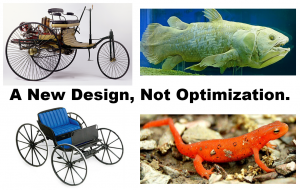As Tom English and others have discussed previously, there was a book published last year called Introduction to Evolutionary Informatics, the authors of which are Marks, Dembski, and Ewert.
The main point of the book is stated as:
Indeed, all current models of evolution require information from an external designer to work.
(The “external designer” they are talking about is the modeler who created the model.)
Another way they state their position:
We show repeatedly that the proposed models all require inclusion of significant knowledge about the problem being solved.
Somehow, they think it needs to be shown that modelers put information and knowledge into their models. This displays a fundamental misunderstanding of models and modeling.
It is a simple fact that a model of any kind, in its entirety, comes from a modeler. Any information in the model, however one defines information, is put in the model by the modeler. All structures and behaviors of any model are results of modeling decisions made by the modeler. Models are the modelers’ conceptions of reality. It is expected that modelers will add the best information they think they have in order to make their models realistic. Why wouldn’t they? For people who actually build and use models, like engineers and scientists, the main issue is realism.
To see a good presentation on the fundamentals of modeling, I recommend the videos and handbooks available free online from the Society for Industrial and Applied Mathematics (SIAM.) “[Link]”.
For a good discussion on what it really means for a model to “work,” I recommend a paper called “Concepts of Model Verification and Validation”, which was put out by the Los Alamos Laboratories.

